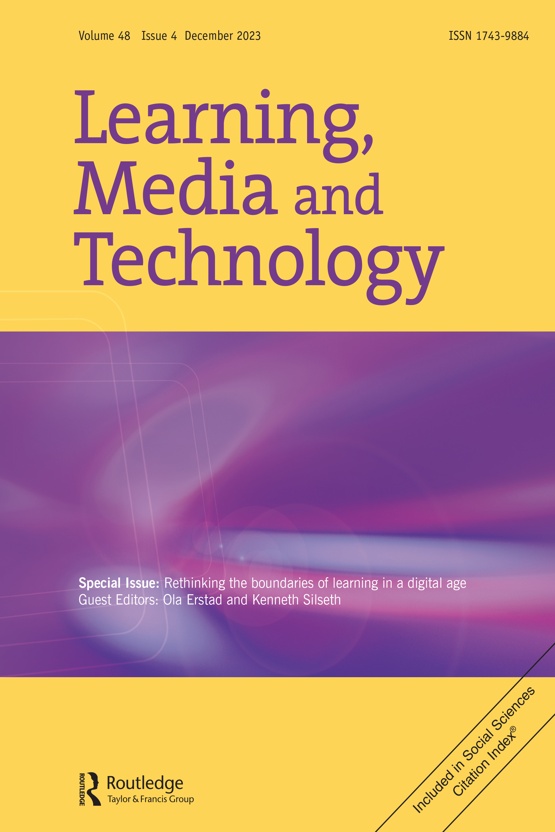Submit a Manuscript to the Journal
Learning, Media and Technology
For a Special Issue on
Fiction in Learning, Media and Technology Research
Abstract deadline
07 June 2024
Manuscript deadline
28 February 2025

Special Issue Editor(s)
Stefan Hrastinski,
KTH Royal Institute of Technology
[email protected]
Eamon Costello,
Dublin City University
[email protected]
Lina Rahm,
KTH Royal Institute of Technology
[email protected]
Fiction in Learning, Media and Technology Research
“The facts, alone, will not save us. Social change requires novel fictions that reimagine and rework all that is taken for granted about the current structure of society. Such narratives are not meant to convince others of what is, but to expand our own visions of what is possible.” (Benjamin, 2016, p. 1)
The future of technology in education has perhaps never been more uncertain than today. Major shifts, such as rapid AI developments, increased commercial interests, and the COVID-19 pandemic, have brought about uncertainties about what education might look like in the future. In the turbulent times in which we are living, it is more difficult than ever to predict the future of education. Instead, an alternative approach drawing on social science fiction has gained increasing attention, which is to use fiction to imagine education futures (Houlden & Veletsianos, 2023). Given the increase in this scholarship it is timely to ask: Can fiction help us unlock alternative possibilities, shine new lights that lift others up and confront injustices and inequalities in education? Or, are fictions mere fantasies we engage in while replicating and reproducing old orders? Further, can there be dangers in engaging in fiction around education, perhaps creating lock-ins in certain solutions or causing a race to colonize the future?
Education fiction can lean towards being more informed or more speculative (Hrastinski, 2023). Fiction is of course always speculative to some degree, otherwise, it would not be fiction but also informed to some degree, because our experience affects what we write. In this special issue, we are interested in the relationship between fiction and learning, media and technology research. How can research be used to inform fiction on the role of technology in education? Examples include interviews with academics that were used to write a story on ‘the life and times of university teachers in the era of digitalization’ (Teräs et al., 2022) or analysis of job advertisements to create fictive learner designer personae (Costello et al., 2023). How can fiction be used to speculate on the future of technology in education? Examples include Selwyn et al. (2020) and Macgilchrist et al. (2020) who wrote speculative vignettes on future digitally infused schools. The vignettes were then analyzed in relation to the literature to consider the social implications of the imagined schools.
Questions remain however as to, the legitimate role of fiction in educational research and scholarship such as how this emerging form can be evaluated (Cox et al., 2023) and why we would engage in this i.e. who could be advantaged or disadvantaged through fictions, and in what ways (Houlden & Veletsianos, 2023)?
We invite empirical and theoretical articles that may use a variety of conceptual and methodological approaches. Topics may include but are not limited to, the following in relation to learning, media and technology research:
- Informed education fiction
- Speculative education fiction
- Writing and designing education fiction
- Analyzing education fiction
- Conceptual articles on education fiction
- Methodological articles on education fiction
- Fiction and education histories, presents, and futures
References
Benjamin, R. (2016). Racial fictions, biological facts: Expanding the sociological imagination through speculative methods. Catalyst: Feminism, Theory, Technoscience, 2(2), 1-28. https://doi.org/10.28968/cftt.v2i2.28798
Costello, E., Welsh, S., Girme, P., Concannon, F., Farrelly, T., & Thompson, C. (2023). Who cares about learning design? Near future superheroes and villains of an educational ethics of care. Learning, Media and Technology, 48(3), 460-475. https://doi.org/10.1080/17439884.2022.2074452
Cox, A., Cameron, D., Checco, A., Herrick, T., Mawson, M., & Steadman-Jones, R. (2023). Criteria of quality in fiction-based research to promote debate about the use of AI and robots in Higher Education. Higher Education Research & Development, 42(3), 559-573. https://doi.org/10.1080/07294360.2022.2087603
Houlden, S., & Veletsianos, G. (2023). Impossible dreaming: On speculative education fiction and hopeful learning futures. Postdigital Science and Education, 5(3), 605-622. https://doi.org/10.1007/s42438-022-00348-7
Hrastinski, S. (2023). Characteristics of Education Fiction. Postdigital Science and Education, 5(3), 516–522. https://doi.org/10.1007/s42438-023-00400-0
Macgilchrist, F., Allert, H., & Bruch, A. (2020). Students and society in the 2020s. Three future ‘histories’ of education and technology. Learning, Media and Technology, 45(1), 76-89. https://doi.org/10.1080/17439884.2019.1656235
Selwyn, N., Pangrazio, L., Nemorin, S., & Perrotta, C. (2020). What might the school of 2030 be like? An exercise in social science fiction. Learning, Media and Technology, 45(1), 90-106. https://doi.org/10.1080/17439884.2020.1694944
Teräs, H., Teräs, M., & Suoranta, J. (2022). The life and times of university teachers in the era of digitalization: A tragedy. Learning, Media and Technology, 47(4), 572-583. https://doi.org/10.1080/17439884.2022.2048393
Looking to Publish your Research?
Find out how to publish your research open access with Taylor & Francis Group.
Choose open accessSubmission Instructions
Please submit a 300-word abstract, title and author details to [email protected]. Abstracts will be accepted on a rolling basis with a final deadline for the submission of abstracts by June 7, 2024. We also request that you address how the full paper (expected to be between 6,000 and 8,000 words including references) will fit the aims and scope of the Learning, Media and Technology journal, in the specific context of this call. All final papers will be subject to the usual blind reviewing and refereeing processes. Full manuscript submission for blind peer review is due February 28, 2025. Please remember to select the special issue title when submitting your full manuscript in ScholarOne. Papers will be published online as soon as they are accepted with the Special Issue as a whole to follow.